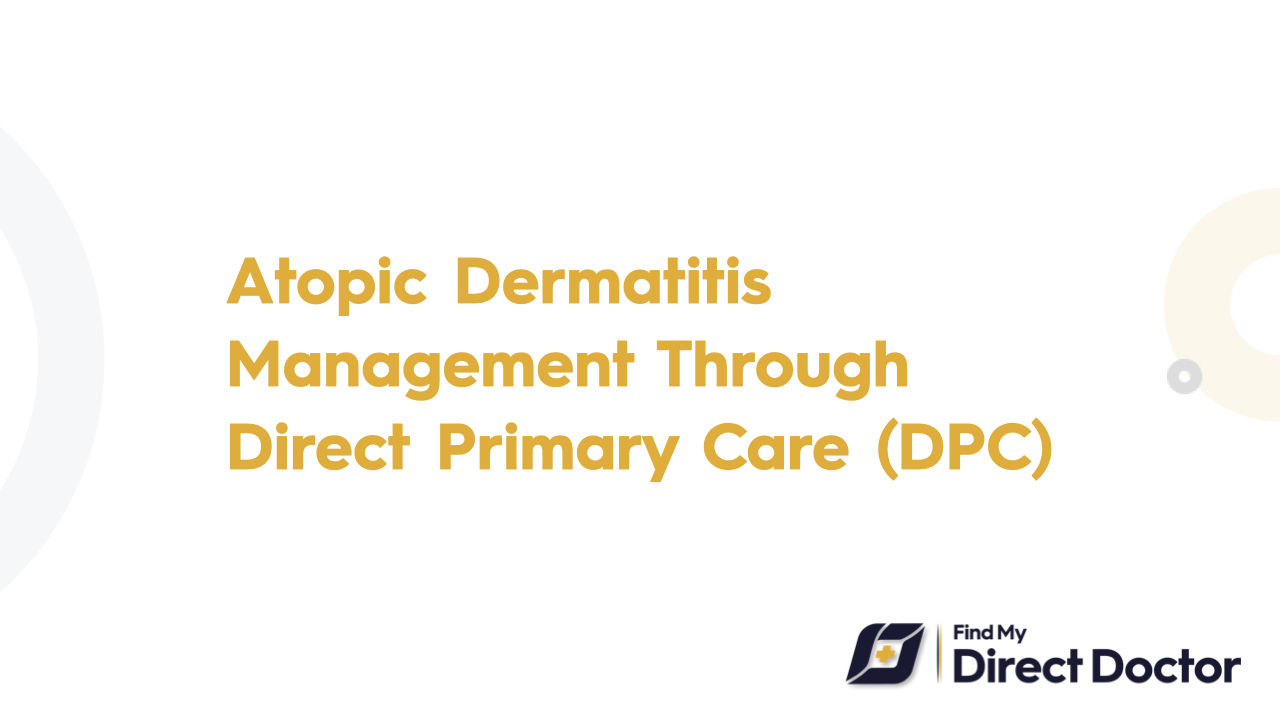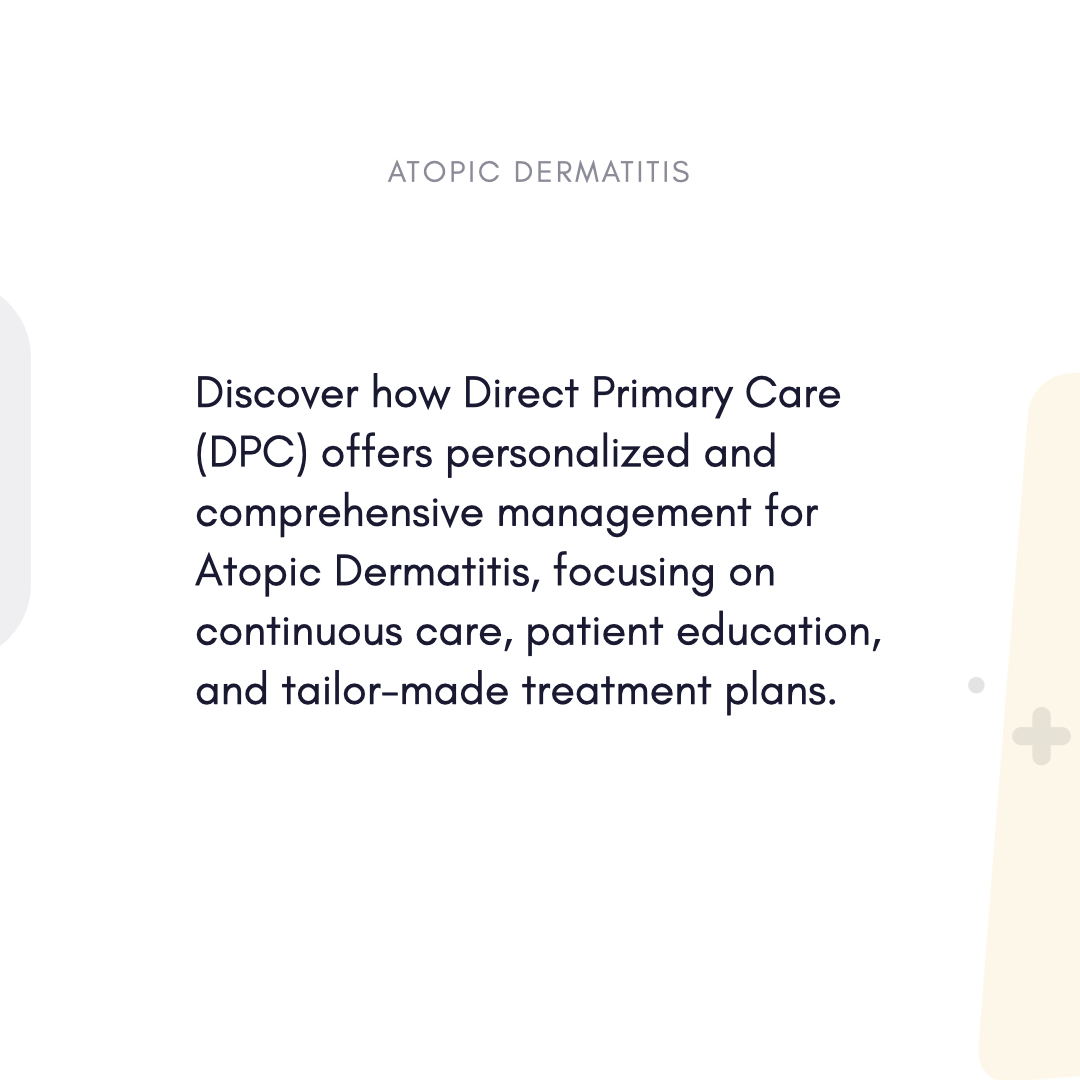



Atopic dermatitis (eczema), a chronic inflammatory skin condition, causes itchy, red, and cracked skin. Managing it requires a combination of lifestyle adjustments, medications, and consistent monitoring. Direct Primary Care (DPC) offers a patient-centered approach to eczema care, combining accessibility, affordability, and personalized strategies to reduce flare-ups and improve quality of life.

Causes: Genetic predisposition, immune dysfunction, environmental triggers (e.g., allergens, stress).
Symptoms: Dry skin, intense itching, redness, scaly patches, sleep disruption.
Complications: Skin infections, anxiety/depression, chronic lichenification (thickened skin).
Diagnosis: Clinical evaluation, allergy testing, and ruling out other conditions (e.g., psoriasis).
Direct Primary Care (DPC) is a membership model ($50–$150/month) offering unlimited access to a primary care physician. For eczema patients, this means:
No wait times for urgent flare-ups or infected rashes.
Transparent pricing—discounted topicals, allergy tests, and specialist referrals.
Holistic care addressing skin health, mental well-being, and trigger avoidance.
In-office evaluations: Assess rash severity and rule out infections (e.g., staph).
Topical steroids: Prescribe hydrocortisone or triamcinolone creams at wholesale prices ($10–$20/tube).
Non-steroidal options: Calcineurin inhibitors (tacrolimus) or PDE4 inhibitors (crisaborole) for sensitive areas.
Trigger identification: Patch testing for allergens (e.g., nickel, fragrances).
Skincare routines: Recommend hypoallergenic moisturizers and gentle cleansers.
Lifestyle coaching: Stress management techniques and diet adjustments (e.g., eliminating dairy).
Regular follow-ups: Track skin improvement and adjust treatments.
Mental health referrals: Counseling for anxiety or sleep issues linked to chronic itching.
Pediatric care: Specialized plans for children to prevent school absences or bullying.
Accessibility & Continuity:
Same-day appointments for sudden flares or infected skin.
Consistent care from one provider familiar with your eczema history.
Cost-Effective Solutions:
Topicals: Hydrocortisone cream for $10 vs. $30+ retail.
Allergy tests: Cash-pay rates ($50–$100) vs. $300+ with insurance.
Personalized Care:
Tailored plans for infants, adults, or those with comorbid allergies/asthma.
Coordination with dermatologists or allergists for severe cases.
Following AAAAI/ACAAI guidelines, DPC emphasizes individualized care:
Emollient therapy: Prescribe ceramide-rich moisturizers and oatmeal baths.
Trigger avoidance: Checklists for common irritants (e.g., wool, harsh soaps).
Systemic therapies: Coordinate biologics (e.g., dupilumab) or immunosuppressants (e.g., cyclosporine).
Wet wrap therapy: Teach parents to apply medicated dressings for children.
Education: Explain the "itch-scratch cycle" and strategies to break it.
Preventive care: Annual flu shots and skin infection monitoring.
Case 1: Emma, 7, reduced flare-ups by 70% using DPC’s hypoallergenic skincare plan and stress-reduction techniques.
Case 2: James, 35, avoided oral steroids through DPC’s early intervention with topical calcineurin inhibitors.
Q: Can DPC prescribe biologic medications?
A: Yes! DPC coordinates with specialists for advanced therapies like dupilumab.
Q: Are allergy tests covered?
A: DPC negotiates cash-pay rates for patch testing ($50–$100).
Q: How does DPC handle infected eczema?
A: Immediate antibiotic prescriptions and follow-ups to ensure healing.
Reduces flares: Early treatment and trigger avoidance prevent worsening.
Simplifies care: One provider manages medications, allergies, and mental health.
Empowers patients: Education on skincare routines and lifestyle changes fosters control.
DPC aligns with AAAAI/ACAAI recommendations by:
Individualizing care: Tailor treatments to patient age, severity, and triggers.
Reducing costs: Affordable topicals and tests minimize financial strain.
Enhancing education: Teach self-management skills to improve adherence and quality of life.
Atopic dermatitis can be relentless, but with DPC, you gain a partner dedicated to personalized, affordable, and compassionate care—helping you soothe your skin and reclaim your confidence.
